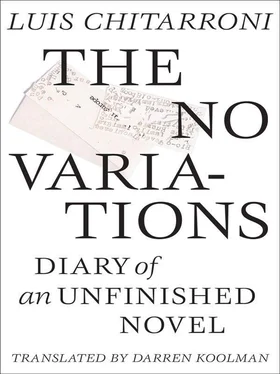Still, how could people neglect to mention the dog — be it a Pomeranian, Chihuahua, Pekinese, or even a Yorkshire terrier, for that matter — when her apartment was just a single room? There’s nothing so indecent — as Pepe Bianco never tired of repeating — as rhetorical questions.
I’ll never forget it. The first people the police allowed to enter were Dos and me — along with Nelly of course, her mother. Wilson, the doorman, let us in; he stayed on the threshold. The place was a temple to narcissism. There was a series of photographs taken by Richard and Charlie at Villa Gesell in which Inés is shown playing the coquette with everyone present — not only the two photographers, but also D.H., who just happened to be visiting the seaside village with a “friend,” and then another of her in a Citroën, posing with the dog. The best photo in the apartment didn’t feature Inés, however: it was a snapshot of Christopher Niaris, taken in motion, capturing the glowing snake trail of the cigarette perched greedily between his lips, evoking the beauty and cupidity of a man who couldn’t be more different from Nurlihrt. Christopher Niaras was also featured in the largest picture we found, enshrined in a vanity cupboard — a black and white shot, masterwork of Calixto Mazzeloth — showing Niaras in his characteristic pose, pouting like a dandy Don Juan, though he was never interested in women; after which we were treated to a photo of a man who looked to be in his late fifties, with a profusion of white hair, wearing very thick glasses, behind which his farsighted eyes seemed full of his then-recent if premature diagnosis of cancer [colon]. Meanwhile Sofía was sleeping with Scacchi, Eloy was sleeping with Niaras. Oh, God .
The dog was running around with its tongue hanging out, moaning and groaning; Eloísa called such behavior — when Nurlihrt was out of earshot— convulsions of canine delight. Entre nous , her exuberant flaunting, her canorous bays, are they not in fact … symphonies? All of us are prone to exaggeration. Soon, Schnabelzon, her psychiatrist, arrived. We’d met on a number of occasions, because he was something of a bohemian, or anyway liked to seem like one, if only until, like Cinderella, the clock struck twelve. Dos was fawning all over him.
a) It was summer. She waited until midnight, as for [adultery, ennui, self-denial?], before taking a non-prescribed dose of Tryptizol, and smoking a joint, or as she used to say, “killing her daemon”: the servile attitude she used to have as a writer, the ignorance she once flaunted; her anxiety as to how future generations might view her works — the links of her life as irregular as the beats of a headless dactylic line. “Dreaming with Tears in My Eyes” (Jimmy Rodgers). Bags packed, opaque. She went to bed thinking something would interrupt it, this filthy business; that Nurlihrt would call and wake her. The noise of the phone, the next link in the chain, the dream that would in fact go on without her.
The certainty of being disturbed:
[ That the sound of the telephone would still be heard through death’s muffling hands. That something would eventually wake her from her sleep. Nurlihrt, the telephone, whatever. That there would be another link in the chain. That the sound of the phone would be louder even than death. Yes, louder than the sudden, if expected, vertiginous, deafening hands of death .]
b) She’d fallen asleep listening to a song by Laura Nyro: “And When I Die” … How obvious! If the so-called experts had paid attention, or at least understood a little English, they’d have realized it wasn’t just the note that indicated Inés’s intention to die.
The dog was running around. On the nightstand, some books: Dickson Carr’s He Who Whispers , Marguerite Duras’s La Vie tranquille —in a Spanish translation by her Avellaneda school friend — Henry Miller’s The Colossus of Maroussi …
[ The Woman Who Rode Away , by D. H. Lawrence. A Corso or Ferlinghetti anthology. L’âme romantique et le rêve , by Albert Béguin. Pale Fire , the poorly bound South American edition, with an inscription furiously scribbled in HB pencil: “It’s no use, I feel sorry for N. and the kids, but I just can’t read it.”]
The lessons Nurlihrt had intended to give her weren’t enough. Nothing is for so short a life. Inés persisted in reading the worst translations, forgetting all the French she learned at the Lycée, her enthusiasm for Charles Trenet and Jacques Brel. In the typewriter was a page on which was written what one would have to consider a poem — hardly a last will and testament, since it had line breaks and didn’t respect the margins. [It was difficult to remove: four carbon sheets were in the way]. Having torn it out, I compared the contents with those of the letter that was brought by the youth. The Hermes Baby typewriter had a font that imitated the childish curlicues of a schoolgirl’s penmanship — but this was typical of Inés. Nurlihrt was the one who showed me her final drafts.
Of life, The Illness questions death
And someone says: Of nearly all there is of life …
Nothing suggests evil does his rounds like a beast
Without a spoor. The dog bites. If only Dos had noticed
As he left — that I die—
The illness won’t deny .
But didn’t the others notice?
Before dropping, the elevator door
Will have shut, my reach unnoticed .
A mess indeed: it was the Colasiopo brothers’ Dalmatian that bit her.
For some reason — I can’t recall what — it was necessary to head downstairs, so the three of us all went down together. Dos was fawning all over the psychiatrist again, particularly there in the elevator, but it was hard for me to feel comfortable around Schnabelzon, particularly there in the elevator. I remember timidly lowering my eyes and noticing his two-tone shoes. (I’m not sure what Doctor Maranón would say on the matter, but I’ve always thought that two-tone shoes were a form of orthopedic substitution, popularized to make up for the loss of spats; or else, with porteños anyway, to serve as twelve-inch godemichés to compensate for a similar lack.) He trimmed his moustache with obsessive care, like an actor from the forties. The elevator door opened on a young man. The fashions of the day didn’t especially flatter any of us, but they seemed to have singled this fellow out for a particular savaging. Beneath his ample mane — which seemed to grow more outward and upward than downward — was a face adorned with metal-rimmed glasses, eczema, and a smile at once genial and glum. He wore a coat that was two or three sizes too large, a patterned neckerchief, low-rise corduroy bell-bottoms, and clogs. He approached us as if he knew us. Dos embraced him. As if he was an old friend. An intimate embrace, with every sort of clasp and clap, suggesting a practiced ritual, an oft-repeated rite. Afterward, Dos turned to me and said he felt sick. How is it possible? asked the kid. How? Only yesterday Inés had spoken to him, written to him … He had, folded up at the bottom of his coat pocket, her final piece of correspondence. We were standing just outside the elevator door, in the lobby, when Dos asked anxiously, “Has anyone told Nicasio?” immediately heading off to look for a payphone. Then, after pushing the doorbell first with thumb alone and then with the weight of his entire body [seek and ye shall find], in hopes of getting a look inside, a short gentleman entered (no doubt buzzed in by the doorman, Maglio, Wilson, the Uruguayan knew him) wearing a big raincoat and bearing a bouquet of flowers. On seeing us seeing him, he reacted with a “what gives?” sort of look, as Elena would have put it, before asking us “what happened?” Schnabelzon told him everything, and, turning to us, introduced the guy as “Doctor Perete.” I had no idea who Doctor Perete was, but he offered us each a mint, as well as a consoling arm to the kid whom Dos had hugged, behind whose smile he detected, with professional keenness, a need for consolation. Then my sister arrived, also with a bouquet of flowers. What happened? Why had I called her at the office so early in the morning? Inés was dead. They supposed it was suicide. How was that possible? It was possible. It was enough to go up to her flat to see that much. Who else was up there? Did Oliverio know yet? What about Nicasio? Doctor Perete asked her if she was an acquaintance. My sister said NO, as if she was ashamed, as if she wanted to deny their relationship. Dos returned from his attempt to contact Nicasio with what looked like a pair of rent boys he’d picked up along the way. Not a bad day’s work. The nearest payphone had been in a restaurant bar called 05 in Paraná in front of the plaza. It turns out the rent boys weren’t Dos’s latest conquests but actually two of Inés’s neighbors, Richard and Charlie, who’d been having breakfast at 05 where they were informed of the tragedy. Dos hadn’t been able to get through to Nicasio. Neither did he manage to get the whole message through to Astrid, because he got cut off and found he was out of change — likewise the two other guys. [One Christmas, they knocked on Inés’ door to invite her over. Even their flat was bigger than hers. But she was on her own with no other company than the Winco turntable on which she was playing “Christmas” by the Who …]. They invited us up to their flat, the one opposite Eloise’s, and so the retinue ascended [“we ascended”?] in three groups distributed between two elevators and a stairwell.
Читать дальше












